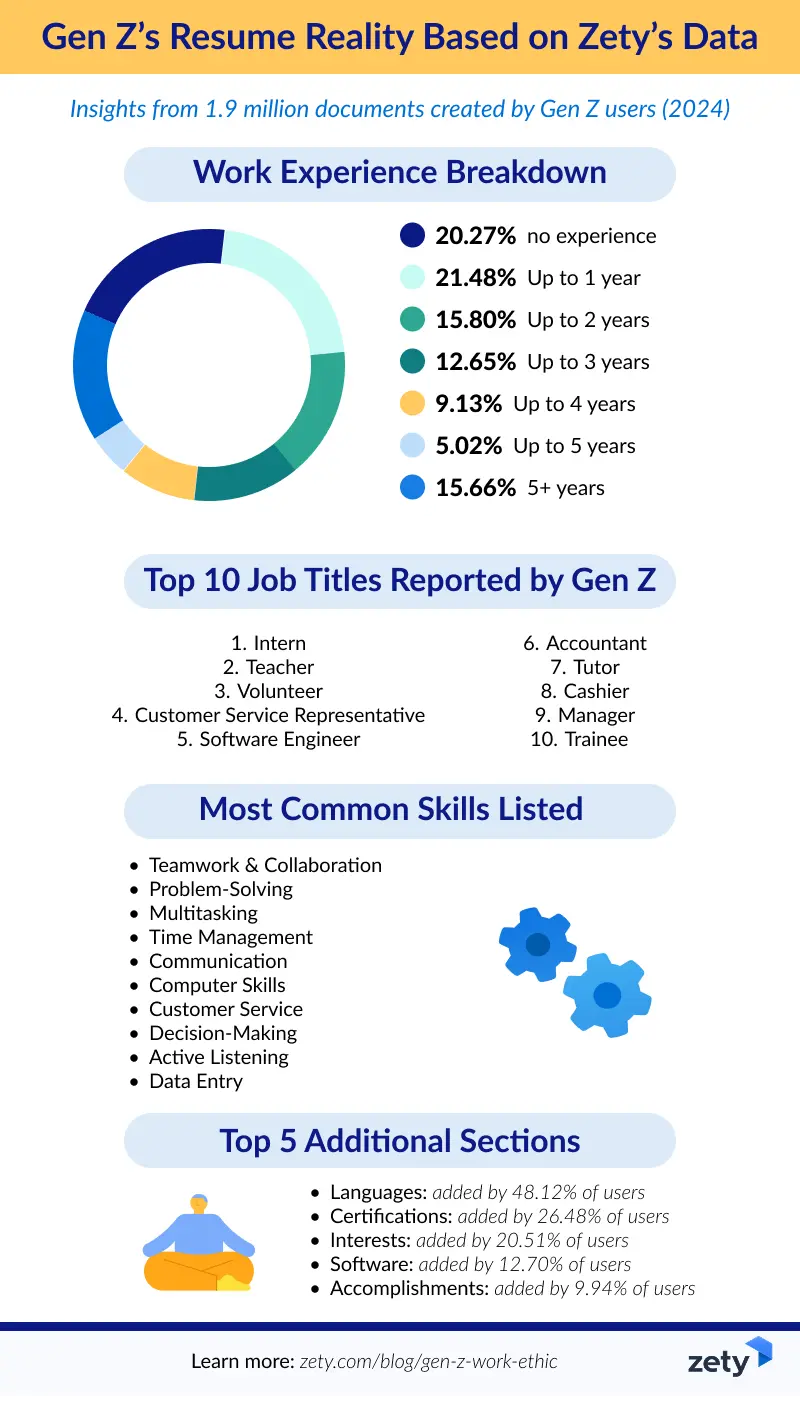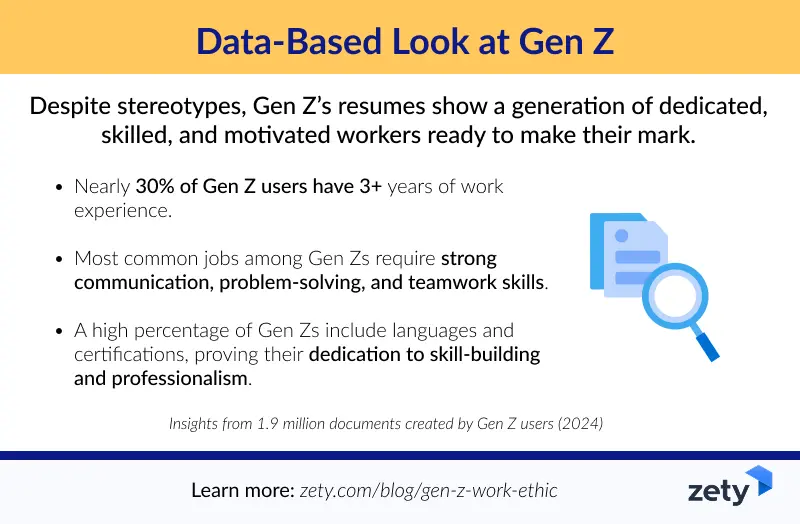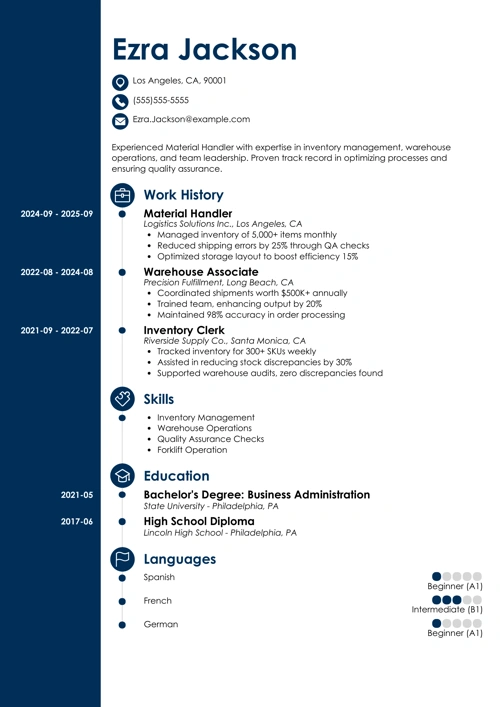Heated arguments arise about Gen Z’s work ethic: managers admit to firing Gen Z workers months after hiring, and Gen Zs complain of feeling disillusioned with their career prospects.
Is it true that the Gen Z workforce has an anti-work attitude? Or is this just a biased view caused by another generation gap? I’ll take a close look at Zety’s builder data and other data sources to gain real insights into Gen Z’s work attitudes.
Top Insights:
- Nearly 9 in 10 members of Gen Z feel that their work must have meaning.
- 44% of the Gen Z workforce rejected a potential employer due to their moral principles.
- Nearly 30% of Gen Z job seekers have 3+ years of experience, which challenges the view that they’re not ready for the workforce.
- The most common skills listed by Gen Zs on resumes include teamwork, problem-solving, communication, and multitasking—exactly what managers claim they lack.
Who Belongs to Generation Z?
According to the Pew Research Center, Gen Z was born between 1997 and 2012. Its childhood was shaped by the year 2000 and the cultural as well as historical landscape of the first decade of the 21st century: 9/11 and the Global War on Terrorism, mobile phones becoming an everyday necessity, the growing popularity of reality shows, and the creation of social media. They experienced a nearly constant stream of information from television and the internet, which helped them gain awareness of social and environmental problems. However, it also made Generation Z face a disappointing reality: They inherited a flawed world built on a planet that’s warming up rapidly.
Gen Z Becoming Young Adults
The chaos at the onset of the COVID-19 pandemic marked Gen Z's early adulthood. Due to restrictions, Gen Zs didn’t experience the classic milestones that Millennials and previous generations had, such as going to prom, living on college campuses, and partying in dorms. Many older Gen Zs working entry-level jobs, such as retail and food service, faced layoffs due to the coronavirus.
These struggles affected them deeply: a 2022 survey by Harmony Healthcare IT found that the pandemic harmed the mental health of 68% of Gen Zs. At a similar time, a Harvard study reported that 58% of Gen Z respondents lacked meaning or purpose in their lives.
How are all these factors connected to Generation Z’s workplace behaviors? Let’s see.
Gen Z’s Work Values
Workplace attitudes change with every generation. While Baby Boomers have a live-to-work philosophy and believe that hard work leads to success, younger employees hold different opinions. According to a survey conducted by Deloitte in 2024, nearly 9 in 10 members of Generation Z need to feel a sense of purpose at work—which contrasts strongly with Boomers’ belief that work in itself is valuable. Work is no longer a significant part of one’s identity, as only 36% of Gen Zs see it as a crucial element.
Here’s another statistic that can shock older members of the workforce: 50% of Gen Zs have rejected a work assignment, and 44% rejected a potential employer based on their personal ethics.
Additionally, 59% of Gen Zs think that the popularity of generative AI will eliminate jobs and will require them to reskill. Unfortunately, many members of this generation have no free time to develop new competencies, as 45% need a second part- or full-time job to make ends meet.
Managers’ Views of Gen Z’s Work Ethic
The U.S. labor force consists of several generations of workers, with millennials being the largest group at 36%. As leadership positions are usually occupied by more experienced workers, it’s understandable that generational conflicts might appear. A decade ago, everyone complained about millennials in the workforce—now, all the blame seems to be on Generation Z.
According to a survey conducted by Intelligent.com, only 25% of companies that hired recent college graduates were happy with all these newcomers. The vast majority admitted that only some of the hired Gen Zs were successful.
So, what’s the problem with those who fail?
- 50% lacked motivation or initiative
- 46% lacked professionalism
- 39% had poor communication skills
- 34% didn’t have problem-solving skills
- 1/3 hires didn’t have teamwork skills
Wait, here’s more: 60% of surveyed companies had to fire a Gen Z employee.
The bad news continues, as surveyed hiring managers have rather negative beliefs about Gen Z workers: 65% say that they’re entitled, 63% think they get offended too easily, and 55% think they lack a work ethic. Over half of hiring managers say that recent college graduates are unprepared for the workforce and have poor communication skills.
When it comes to professionalism, 1 in 5 hiring managers believe that Gen Zs can’t manage the workload, and they’re often late to start work. Additionally, 19% say that college graduates don’t dress appropriately and use language that’s not suitable for work.
To sum up, if you decide to hire 3 new employees from Generation Z, there’s a big risk that at least one of them will be unprofessional, uncommunicative, and uncooperative.
But that’s all based on managers’ opinions. Can it be truly that difficult to find good employees in this generation?
Resumes Speak Volumes on Gen Z’s Work Ethic
Is there a way to learn the truth about Gen Z’s preparedness for work? I’m happy to say: yes!I’ve looked at job applications created in the Zety resume builder to inspect the information entered by members of Generation Z. And, oh boy, did they deliver!
This chapter is based on an analysis of 1,908,767 documents created by 1,499,710 users from January 1, 2024, to December 31, 2024. Since Zety resume builder doesn’t collect data related to users’ date of birth or current age, I used graduation years from 2020 to 2029 as points of reference.
Our resume builder's typical Gen Z user is likely to have at least one entry-level job up their sleeve. The median work history listed on a resume is 1.5 years; one in five users from Generation Z reported no work experience, but over 50% have at least one year of experience.
Here’s a breakdown of the total work history reported by Gen Z users:
- 0 years: 20.27%
- Up to 1 year: 21.48%
- Up to 2 years: 15.80%
- Up to 3 years: 12.65%
- Up to 4 years: 9.13 %
- Up to 5 years: 5.02%
- More than 5 years: 15.66%
Since nearly 30% of Gen Z job seekers have 3+ years of professional experience, it’s difficult to believe that so many members of this generation aren’t prepared for workplace challenges.
Let’s take a look at the top 20 job titles reported by Gen Zs:
- Intern
- Teacher
- Volunteer
- Customer Service Representative
- Software Engineer
- Accountant
- Tutor
- Cashier
- Manager
- Trainee
- Assistant Manager
- Sales Executive
- Analyst
- Associate
- Engineer
- Software Developer
- Data Analyst
- Sales Associate
- Assistant
- Receptionist
Have you noticed that many of these jobs require strong communication, problem-solving, and teamwork skills? Incidentally, according to managers, these are the qualities that Generation Z is supposed to lack.
So, let’s see what skills are most commonly listed in their resumes:
- Teamwork and Collaboration: listed by 190,051 users
- Problem-Solving: listed by 158,401 users
- Multitasking: listed by 126,337 users
- Time Management: listed by 99,384 users
- Excellent Communication: listed by 95,496 users
- Computer Skills: listed by 91,630 users
- Customer Service: listed by 86,309 users
- Decision-Making: listed by 80,844 users
- Active Listening: listed by 71,435 users
- Data Entry: listed by 57,239 users
Data from Zety’s resume builder shows that Gen Zs understand the value of teamwork, problem-solving, and communication skills very well—otherwise, they wouldn’t include them in their resumes.
Can we learn anything else about Generation Z based on their resumes? Let’s analyze the additional sections they include to check whether they’re appropriate or not.
Here are the top 10 added sections in Gen Z resumes:
- Languages: added by 48.12% of users
- Certifications: added by 26.48% of users
- Interests: added by 20.51% of users
- Software: added by 12.70% of users
- Accomplishments: added by 9.94% of users
- Additional Information: added by 8.93% of users
- Websites, Portfolios, Profiles: added by 6.85% of users
- Personal Details: added by 5.67% of users
- Affiliations: added by 3.43% of users
- Hobbies: added by 0.95% of users
Nothing that would suggest a lack of professionalism or bad work ethic. Over 25% of users added certifications to their resumes, proving they’re actively working on improving their qualifications. Additionally, nearly half of Gen Zs show language proficiency on their resumes, which demonstrates communication skills.
If you think that Gen Z's reported interests could cast them in a negative light, think again: The top 10 interests include classics such as reading, traveling, music, cooking, sports, photography, cricket, writing, singing, and football. I can’t judge if all these were relevant to the jobs they applied for, but they certainly weren’t anything out of the ordinary.

Based on the data I’ve mentioned above, nearly 30% of Gen Z users of Zety resume builder have 3+ years of work experience in a position that relies on interpersonal skills such as communication and teamwork. Our Gen Z users appear to be hard-working professionals, and there’s nothing indicative of a lack of work ethic.
Of course, there’s always a risk that the information on a resume doesn’t reflect the candidate’s real qualifications—just as there’s a similar risk that managers’ opinions of Gen Z applicants are exaggerated. Perhaps the real problem isn’t Gen Z's work ethic but the difference between how each generation approaches work.

About Zety’s Editorial Process
This article has been reviewed by our editorial team to make sure it follows Zety's editorial guidelines. We’re committed to sharing our expertise and giving you trustworthy career advice tailored to your needs. High-quality content is what brings over 40 million readers to our site every year. But we don't stop there. Our team conducts original research to understand the job market better, and we pride ourselves on being quoted by top universities and prime media outlets from around the world.
Sources
- Dimock M., “Defining Generations: Where Millenials End and Generation Z Begins”, Pew Research Center
- Harmony Healthcare IT, "State of Gen Z Mental Health"
- Making Caring Common Project, "On Edge: Understanding and Preventing Young Adults' Mental Health Challenges", Harvard Graduate School of Education
- Deloitte, "2024 Gen Z and Millenial Survey"
- Trendlines, "Changes in the U.S. Labor Supply", Department of Labor.
- Intelligent, "1 in 6 Companies Are Hesitant to Hire Recent College Graduates"


